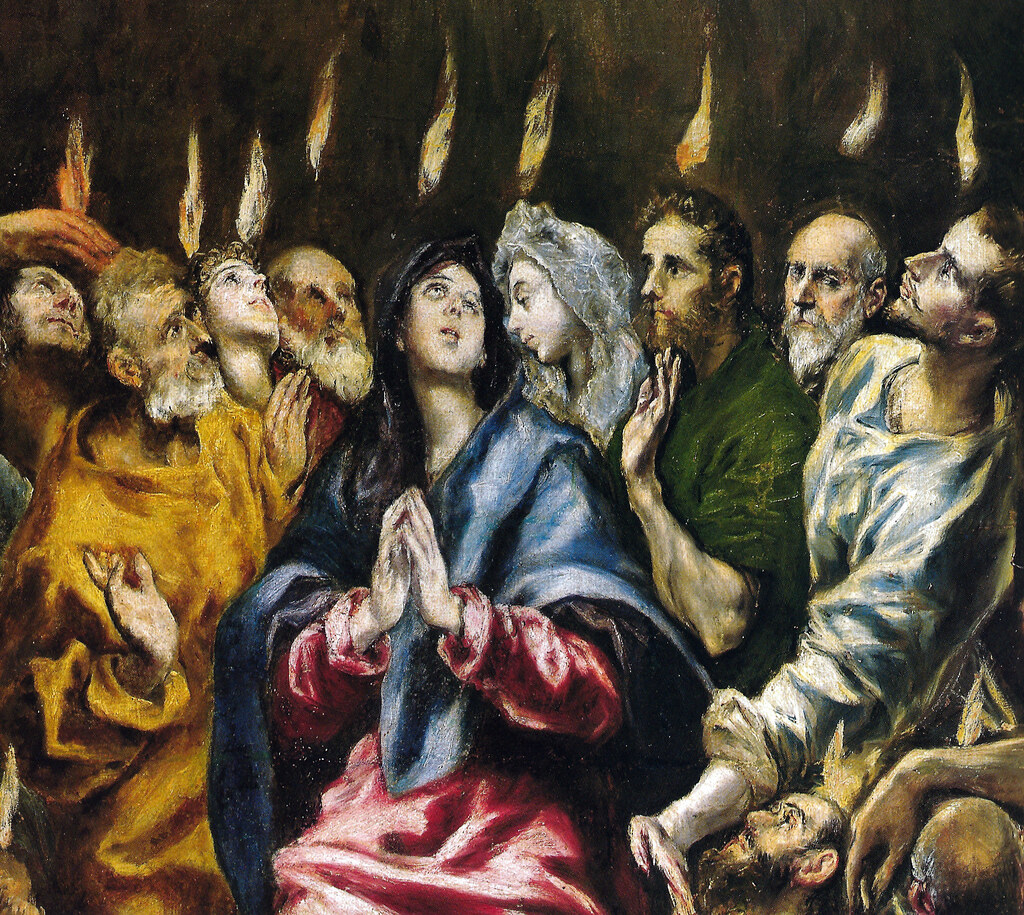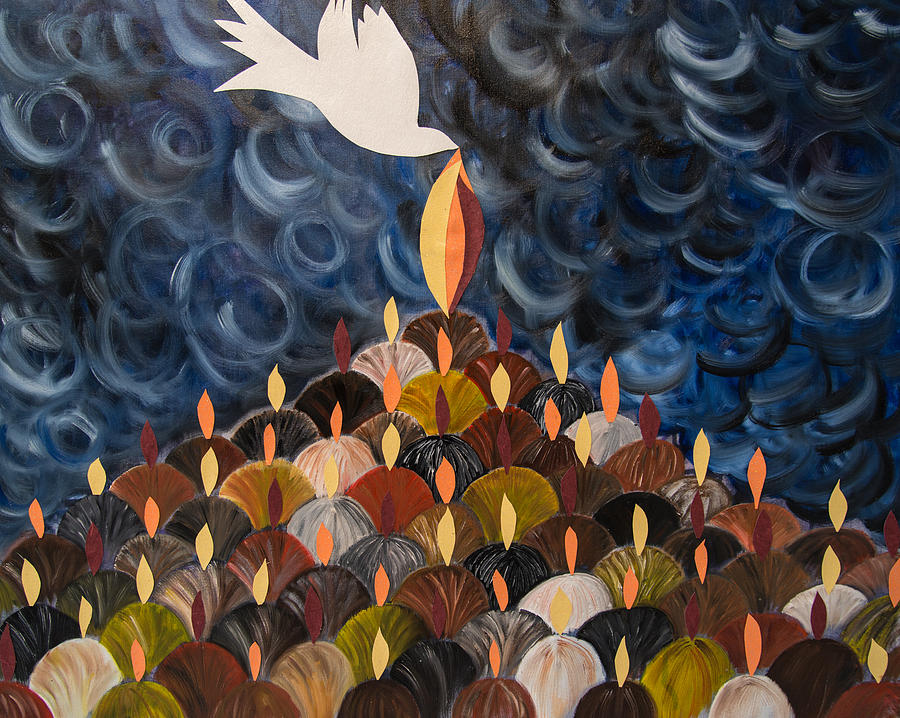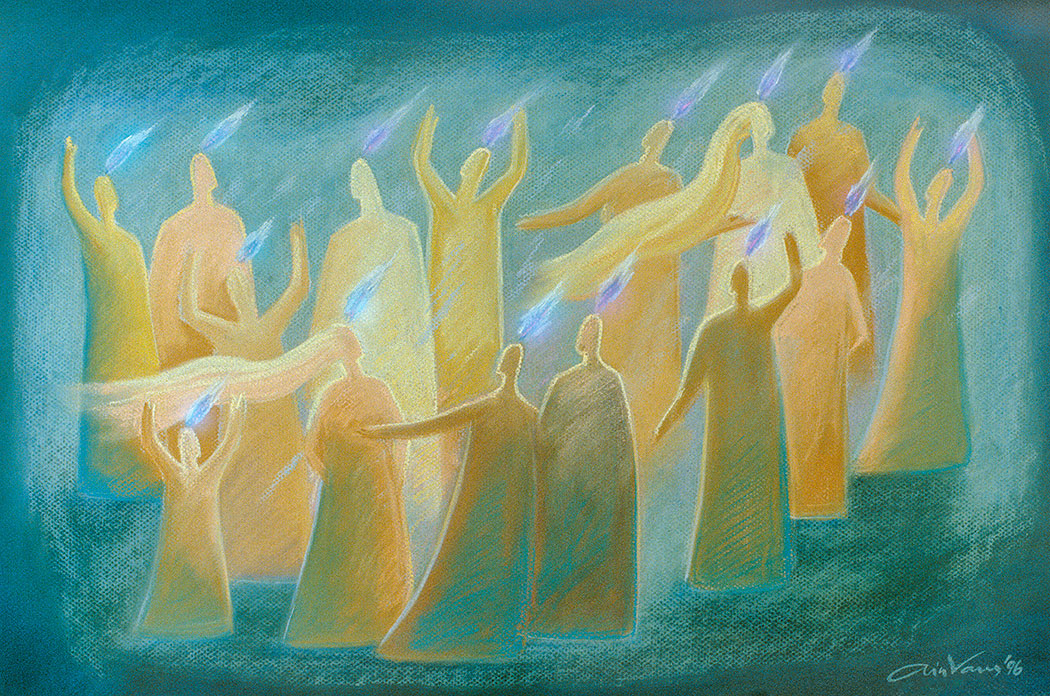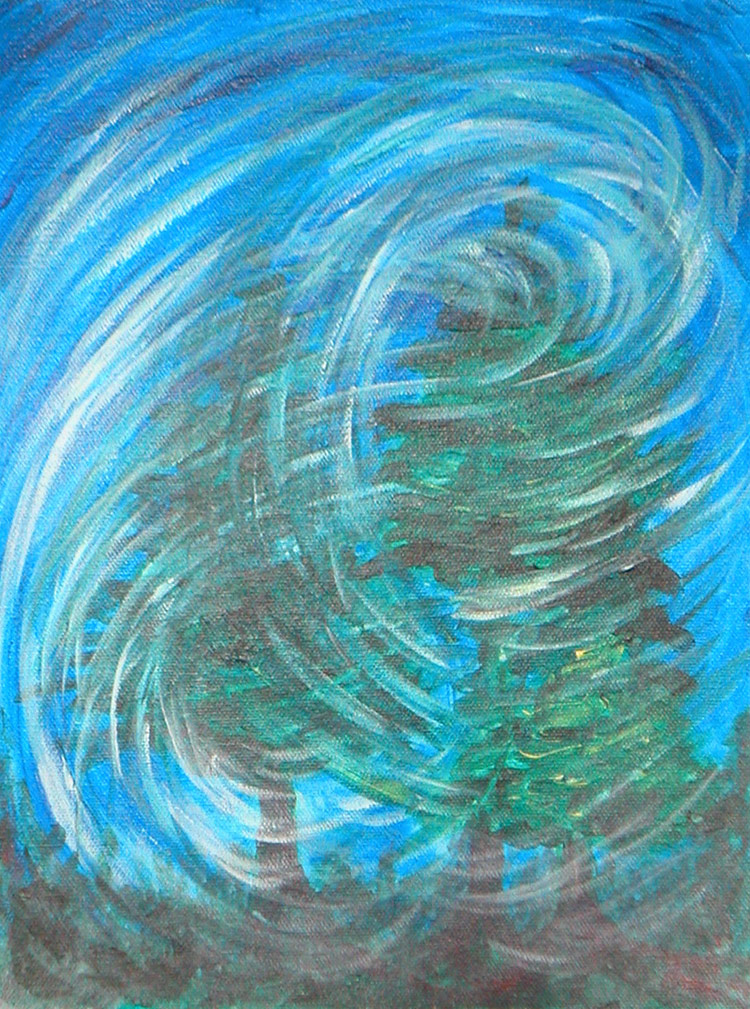Two reflections from a service for Pentecost: reflections written in the context of a high number of deaths within the BAME community due to Covid-19, and the impact on the elderly; and the injustice of the treatment of George Floyd. The theme of breath - and whether or not we can breathe - is refracted afresh on the day of Pentecost. Willie Jennings' commentary on Acts has been transformative and challenging - the Spirit leads to revolution of the intimate; it is the sound of the intimate. Reading Marilynne Robinson's Gilead is also striking - can we too be more aware of the stuff going on beneath the surface; plotting the strife but also the power of reconciliation.
Reflection One
Gilead: During lock down, I’ve picked up Gilead by the American writer Marilynne Robinson. In a slightly contrary way, I’m reading first novel of the trilogy last, after Home and Lilia. I’m taken back to 1965 as the Rev’d John Ames writing to his young son.
Like all of Robinson’s novels, Gilead is full of an awareness of the stuff going on beneath the surface of life: the joy, guilt, dread and tenderness. She plots the causes of strife in families, communities and the world; she also plots the patterns of forgiveness, the universal healing power of reconciliation and love.
There is, perhaps, as the old song goes, a balm in Gilead, to make the wounded whole.
For her, the human creature is sacred; and the world deserves our attention. Sometimes, writes Ames, I have loved the peacefulness of an ordinary Sunday. It is like standing in a newly planted garden after a warm rain. You can feel the silent and invisible life.
(Upper Room - Colin Wilbourn): It’s that silent and invisible life that breaks in afresh today: the power of the Spirit which brooded over creation; which overshadowed Mary; which is breathed out in peace; which kindles flames of justice; and which stirs up the revolution of the intimate.
We left the disciples devoting themselves to prayer; sheltering in an upper room; waiting behind closed doors.
We’ve shared with them in that pulse of prayer - of longing and lament, or resistance and survival. Words woven in our hearts; breathed out on our lips.
And we too wait for the silent and invisible life of the Spirit to renew, refresh and rekindle.
(Pixabay/Gerd Altmann): For there is balm in Gilead, to make the wounded whole.
And even when we’re discouraged; when we think our work’s in vain.
There is balm in Gilead as the Holy Spirit revives our souls again.
The is balm as Jesus speaks to our fears: peace be with you.
In world where we hear the cry, I can’t breathe; Jesus breathes on us, changes us.
He is called Winston to protect his anonymity. He’s 89 and wearing a mask; but his breathing is distressing. The palliative care doctor seconded to that ward provides medication to help him relax; his sons in PPE can hold his hand. He’s not a statistic. He’s their best friend, loved and cherished. But his death wasn’t inevitable; his time hadn’t come. Dr Clarke says ‘our society may be endemically unequal, but no-one in Britain is expendable’.
In world where we hear the cry, I can’t breathe; Jesus breathes on us, changes us.
He is called George, George Floyd and the world knows his name. He’s 46; a black man who died beneath a white police officer’s knee. He was an athlete; a gentle giant; a father; a bouncer who lost his job at a restaurant because of the ‘stay-at-home order’. His life long friend said ‘he was looking to start over fresh, a new beginning… he was happy with the change he was making. His friend Harris says ‘it’s hard to put faith in this system, a system that you know his not designed for you’.
(Descending dove - Jyoti Sahi): Can we be balm in Gilead? As Jesus breathes on his disciples; as he sends his Spirit on them, on us, we are sent to be witnesses.
Jesus breathes out: life and joy; the disciples see and believe.
We are to hear the anguished cries; see the wounded bodies.
For if I can’t breathe, we can’t breathe: Yet as Jesus breathes, our lung capacity increases.
He breathes and the Holy Spirit abides: kindling in their hearts, our hearts, a fire of love; a fire of change.
Every breath we take, the Spirit sighs within: this is the offer of life; of forgiveness; as we become wounded healers.
We point to the crucified and risen Lord: the one who offers the world his death, that the world might know his life. Some will embrace this forgiveness and know the liberation it brings; others will turn away, binding to a past that imprisons.
(Pentecost - He Qi): But we are to recognise this life; turning to it; embracing it; abiding in it. This Holy Spirit comes as comforter, yes; as peace in a hostile world, yes; as balm in Gilead, yes.
It comes not for our own benefit, but to teach us to witness to the truth of God.
The Spirit speaks of energy and movement; imaginative creativity and prophetic challenge: wind, flame and breath.
The Advocate speaks of peace, comfort and courage; of a presence that guards against loneliness; of the pursuit of wisdom in uncertainty; calling for justice when life is not equal.
(Fire dove clip art): The language of God's love, forgiveness and mercy, is expressed in Jesus physical death and risen life in the body.
The promised Spirit, the Advocate, continues to guide and inspire us; drawing us more deeply into truth; enabling us to love. It's a risky and costly pattern of life: speaking with hope rather than colluding with fear; offering compassion not resentment.
Today we celebrate that that is how God communicates with us still: holding, loving, guiding and inspiring with every breath.
This is love: restoring, forgiving, compassionate and transformative.
Reflection Two
(Pentecost - El Greco): In world where we hear the cry, I can’t breathe; Jesus breathes on us, changes us.
Today we are caught up in the transmission of a story which is both intensely personal and also cosmic in scope. It's a story which stretches language to the limits of imagination, passion and extravagance: rushing wind, tongues of flame, exuberant speech.
This story reveals the intimacy and power with which God communicates his love for us. Tongues of flame is a revolution of the intimate (to quote Jennings); the movement of the wind is the sound of intimacy. Our anthem captures the beauty, disruption, bewilderment and hope of this revolution.
One of the many striking things about this story is that amidst the amazement and questioning, there is a radical home coming; things are joined together; miraculous speech and miraculous hearing. People hear in their native tongue; in the the language of their heart.
(Peter - Michael Buesking): As Peter speaks, a community is broken open and recreated in the Spirit; it is a moment of grace as the Spirit overshadows, broods and inspires.
Willie Jennings coined the phrase revolution of the intimate; and he describes Pentecost as: This is God touching, taking hold of tongue and voice, mind, heart and body. Here is untamed grace - subverting our own fantasies of power and vengeance, and kindling something else.
As Peter speaks, this revolution of the intimate is unleashed by the Spirit. Our ears, mouths and bodies are filled with with this language which frees us from oppression and kindles a shared commitment to hope.
To speak this spirit-led heart language means learning to submit to the slow process of increasing our vocabulary, committing to practices, understanding the values and gifts of God’s Kingdom. And the more we learn, the more we fall in love with it.
And as we fall in love, we are called to walk a new road as wounded healers: advocates, comforters, prophets and creatives.
(I will pour out my Spirit on all people - Marianne Gonzales Sims): As Jennings says: speak a language, speak a people. God speaks people fluently. And God wants us to speak people fluently too.
In world where we hear the cry, I can’t breathe; Jesus breathes on us, changes us. And we speak.
We speak not only in words, but in our body language. As Jennings puts it: this will require bodies that reach across massive and real boundaries, cultural, religious and ethnic. It is a body language that says: love your neighbour.
This is, in the words of the prophet Joel that Peter quotes, a new world order. Energised by the spirit, young and old, male and female, slave and free become prophets, dreamers and activities for this new world.
(The day of Pentecost - Ain Vares): We are strengthened because in Jesus, in going to the depths of human despair and alienation, to those places even when we lose ourselves, there is no longer anywhere where God's love is not. Christ's risen life, calls us to new life. In the power of the Spirit, he calls and calls and recalls each of us by name. That Spirit revives us with the breath of love.
This is the promise of abundant life - not just for a few, but for the whole world. We pray, renew the earth.
There is a balm in Gilead to make the wounded whole: when we ask not just who has died or who killed them, but what killed them. We hear the protest, seek repentance and hope for a better society.
When there are disproportionate rates of death in one community - because of age or race - we have to attend to those wounds. And just may be, the spirit will turn them into sites for hope.
There is balm in Gildead to heal the sin-sick soul.
Jana Skarecky): Today we are presented with a vision for how human beings become channels of such love - to be transmitters or translators; to be embodiments of God's story.
In world where we hear the cry, I can’t breathe; Jesus breathes on us, changes us. And we speak. We act.
Like Marilynne Robinson, we’re to notice the stuff going on beneath the surface of life: the joy, guilt, dread and tenderness; and in our lives plot the patterns of forgiveness, the universal healing power of reconciliation and love.
When we feel discouraged, the Spirit revives our souls. We can be balm in Gilead, as the song puts it:
If you cannot preach like Peter,
If you cannot pray like Paul,
You can tell the love of Jesus,
And say He died for all.
I can’t breath; we can’t breath.
Jesus breathes; we breathe.
Tell this love.
© Julie Gittoes 2020










